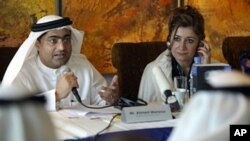Three citizens in the United Arab Emirates were arrested this week after writing pro-reform essays on their blogs and other web sites. The UAE - which is ruled by the monarchy of Sheikh Zayed bin Sultan Al Nahyan - makes many forms of dissent illegal. Ahmed Mansour was taken by ten security officers from his apartment and his computers and passport were confiscated. Nasser Ghaith, who had been calling for greater democracy on his blog, was arrested in a similar fashion. A third, Fahad Al-Shehhy had apparently only been posting pro-democracy comments in an online forum.
Christopher Davidson teaches Middle East politics at the School of Government and International Affairs at Durham University in the UK. He’s also a former resident of the UAE, writes frequently about politics there and was corresponding regularly with both Ahmed Mansour and Nasser Ghaith before their detention this week. VOA's Davin Hutchins spoke with Christopher Davidson about their arrest.
Hutchins: Chris, what exactly were Mansour and Ghaith writing about that might have been perceived as objectionable by the UAE authorities?
Davidson: Well, about two years ago Ahmed Mansour launched a web site in the United Arab Emirates called www.uaehewar.net, essentially translating his national dialogue site. This is the only web site that allows free and fair discussion in the United Arab Emirates. About a year ago it was closed down and since then a number of attempts were made to keep the web site alive, but essentially it’s remained blocked in the United Arab Emirates. Most of his correspondence has been about the attempts by the authorities to harass the founders of the web site.
Hutchins: And how about in the case of Ghaith?
Davidson: In Ghaith’s case most of his writing has been on the economic developments of the United Arab Emirates, though more recently some of his articles that have appeared on blogs have taken on a more political tone. In particular, he wrote a piece recently that questioned the leadership qualities of Gulf rulers especially in the wake of the Arab Spring and elsewhere in the region.
Hutchins: Do you think the UAE authorities are trying to send a signal to would-be dissenters by targeting and detaining three people in one week?
Davidson: Yes, I think so. I think they’ve taken a cross-section of the UAE’s opposition, ranging from a prominent academic to a blogger to an Internet activist. These three people have been arrested, detained without charge, yes, and it’s certainly sent a signal to the UAE national population that dissent has been made formally illegal.
Hutchins: Now would you say these writers, at least what they are writing, would be characterized as revolutionary or moderate? I mean, were they advocating for wider political participation within the context of the present monarchy?
Davidson: Absolutely non-revolutionary and not radical at all. These were attempts to get dialogues up and running, free and fair discussion to talk about having a properly elected parliament in the United Arab Emirates with some kind of universal suffrage. Although there had been elections in the past in the UAE, they had been essentially mocked elections where only a few thousands of the national population has been eligible to vote. Essentially these gentlemen have all been pressing for wider political participation, some kind of proper rule of law to be implemented in the country and also an effort to limit the power of the sheikhs and improve transparency across the board.
Hutchins: Well, given this level of suppression of political speech and the signal that you’ve described the government trying to send, what do you think the odds are of seeing massive pro-democracy movements in the UAE?
Davidson: Well, I don’t think we’ll see a protest on the street in the same way we’ve seen in Bahrain, Oman or elsewhere in the Arab region. I think the wealth distribution is too effective to actually lead [to] that ever happening. I think what we might see a lot more of in the UAE is very intense further activism where petitions do get hoarded around, around thousands of people perhaps, where they do sign up perhaps anonymously at first. But nonetheless the bubble of impossibility is broken and UAE nationals do start to see there is a way of actually having a voice against the status quo and government that currently rules them.




